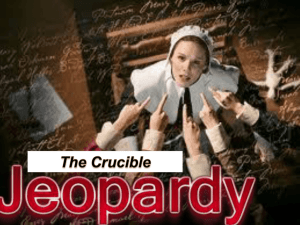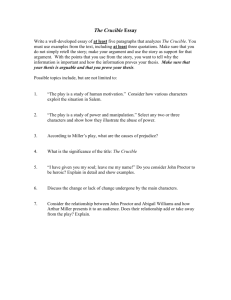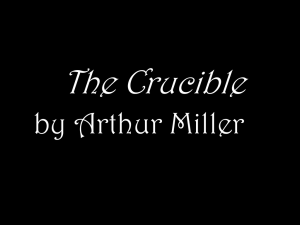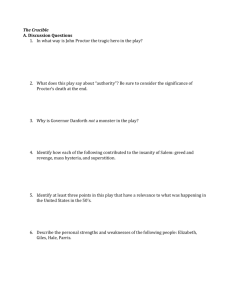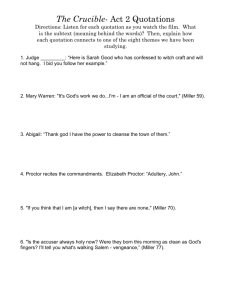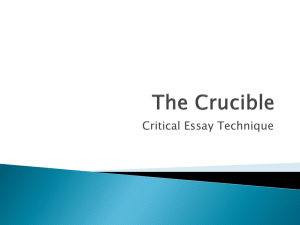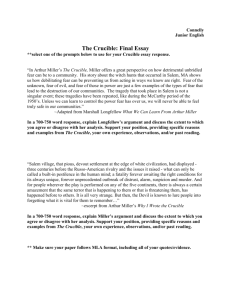The Crucible - ggessbeeslack
advertisement
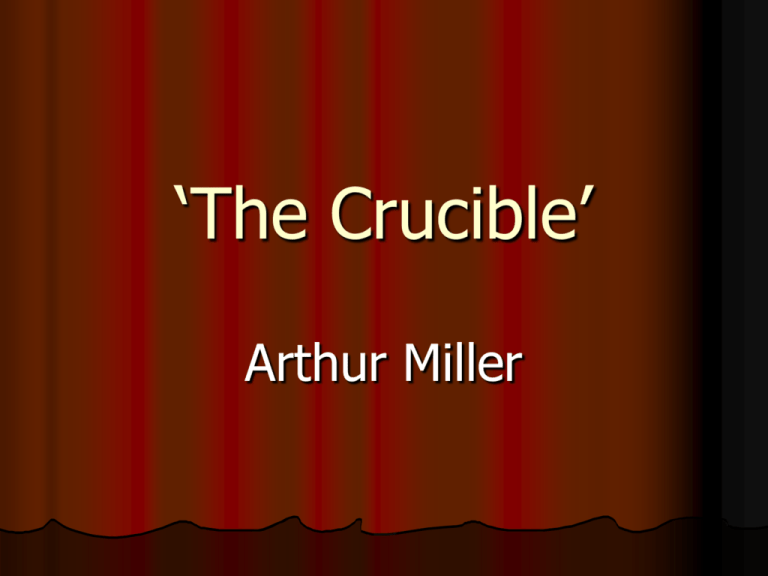
‘The Crucible’ Arthur Miller Historical Background Early in the year 1692, in the small Massachusetts village of Salem, a collection of girls fell ill, falling victim to hallucinations and seizures. In extremely religious Puritan New England, frightening or surprising occurrences were often attributed to the devil or his cohorts. The unfathomable sickness spurred fears of witchcraft, and it was not long before the girls, and then many other residents of Salem, began to accuse other villagers of consorting with devils and casting spells. Old grudges and jealousies spilled out into the open, fuelling the atmosphere of hysteria. The Massachusetts government and judicial system, heavily influenced by religion, rolled into action. Within a few weeks, dozens of people were in jail on charges of witchcraft. By the time the fever had run its course, in late August 1692, nineteen people (and two dogs) had been convicted and hanged for witchcraft. Arthur Miller – ‘The Crucible’ background Arthur Miller was born in New York City on October 17, 1915. His career as a playwright began while he was a student at the University of Michigan. Several of his early works won prizes, and during his senior year, the Federal Theatre Project in Detroit performed one of his works. He produced his first great success, All My Sons, in 1947. Two years later, in 1949, Miller wrote Death of a Salesman, which won the Pulitzer Prize and transformed Miller into a national sensation. Many critics described Death of a Salesman as the first great American tragedy, and Miller gained an associated eminence as a man who understood the deep essence of the United States. Miller composed The Crucible in the early 1950s. Miller wrote the play during the brief ascendancy of Senator Joseph McCarthy, a demagogue whose vitriolic anti-Communism proved the spark needed to propel the United States into a dramatic and fractious anti-Communist fervour during these first tense years of the Cold War with the Soviet Union. Led by McCarthy, special congressional committees conducted highly controversial investigations intended to root out Communist sympathizers in the United States. As with the alleged witches of Salem, suspected Communists were encouraged to confess and to identify other Red sympathizers as means of escaping punishment. ‘The Crucible’ background (cont.) At the time of its first performance, in January of 1953, critics and cast alike perceived The Crucible as a direct attack on McCarthyism (the policy of sniffing out Communists). Its comparatively short run, compared with those of Miller’s other works, was blamed on antiCommunist fervour. There are difficulties however, with interpreting The Crucible as a strict allegorical treatment of 1950s McCarthyism. For one thing, there were, as far as one can tell, no actual witches or devil-worshipers in Salem. However, there were certainly Communists in 1950s America, and many of those who were lionized as victims of McCarthyism at the time were later found to have been in the pay of the Soviet Union. Miller’s Communist friends, then, were often less innocent than the victims of the Salem witch trials, like the stalwart Rebecca Nurse or the tragic John Proctor. Miller also played fast and loose with the historical record. The general outline of events in The Crucible corresponds to what happened in Salem of 1692, but Miller’s characters are often composites. Furthermore, his central plot device—the affair between Abigail Williams and John Proctor—has no grounding in fact (Proctor was over sixty at the time of the trials, while Abigail was only eleven). Thus, Miller’s decision to set sexual jealousy at the root of the hysteria constitutes a dramatic contrivance. The Crucible is best read outside its historical context—not as a perfect allegory for anti- Communism, or as a faithful account of the Salem trials, but as a powerful and timeless depiction of how intolerance and hysteria can intersect and tear a community apart. In John Proctor, Miller gives the reader a marvellous tragic hero for any time—a flawed figure who finds his moral centre just as everything is falling to pieces around him. Themes Power and Empowerment Intolerance Hysteria Reputation Major Characters JOHN PROCTOR ABIGAIL WILLIAMS REVEREND HALE Key Facts Full title · The Crucible Author · Arthur Miller Type of work · Play Genre · Tragedy, allegory Language · English Time and place written · America, early 1950s Date of first publication · 1953 Publisher · Viking Press Narrator · The play is occasionally interrupted by an omniscient, third-person narrator who fills in the background for the characters. Climax · John Proctor tells the Salem court that he committed adultery with Abigail Williams. Key Facts (cont) Protagonist · John Proctor Antagonist · Abigail Williams Setting (time) · 1692 Setting (place) · Salem, a small town in colonial Massachusetts Point of view · The Crucible is a play, so the audience and reader are entirely outside the action. Falling action · The events from John Proctor’s attempt to expose Abigail in Act IV to his decision to die rather than confess at the end of Act IV. Tense · Present Foreshadowing · The time frame of the play is extremely compressed, and the action proceeds so quickly that there is little time for foreshadowing. Tone · Serious and tragic—the language is almost biblical.
